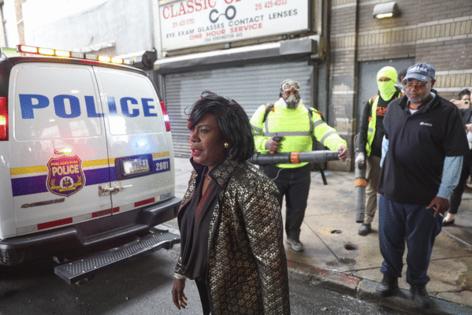Only 28% of Philadelphians approve of Mayor Parker's response to opioid crisis, poll finds
Published in News & Features
PHILADELPHIA — Only 28% of Philadelphians approve of Mayor Cherelle L. Parker’s response to drugs and the opioid crisis despite her high overall poll numbers, according to the Pew Charitable Trusts’ 2025 Philadelphia Resident Survey.
Although Parker received a 63% approval rating overall, residents were skeptical of her administration’s efforts to address opioids and drug use. Thirty-nine percent of survey respondents said Parker’s handling of the situation was “not very good” or “not good.” An additional 33% said they “weren’t sure.”
“We’d ask questions about how much impact people think the mayor can have on different issues that she has prioritized in her first term in office,” said Katie Martin, project director of Pew’s Philadelphia Research and Policy Initiative. “Opioids and drug use was one of the areas that Philadelphians thought she would be able to have the least impact on overall.”
Parker’s “actions to address conditions in Kensington” received a higher approval rating, with 46% of respondents saying they had been “very” or “somewhat” effective. Thirty-nine percent said the mayor’s efforts were “not very” or “not at all” effective. Examples of particular initiatives were not provided in the survey question.
Parker’s office did not immediately comment on the poll.
Since taking office in January 2024, Parker has pledged to end Kensington’s open-air drug market and tackle drug use in the city. Her administration’s strategy has included encampment sweeps, the establishment of a “Neighborhood Wellness Court,” and the development of a recovery house in Northeast Philadelphia.
The Pew survey also found that a growing share of residents say they have been personally affected by opioid usage. Nearly half of respondents reported knowing someone with opioid-use disorder (OUD) — up from 31% in 2019. One in three said they knew someone who had died from an overdose.
Nearly 4 in 10 respondents said they believe the opioid crisis is worsening in the city. Just 8% said they saw improvement.
Nearly half of city residents also reported that OUD has had a negative impact on their neighborhood quality of life. Residents of the river wards — including Kensington, Fishtown, Bridesburg, and Port Richmond — were the most affected, with 76% reporting a negative impact.
Philadelphia residents’ attitudes toward OUD and drug use have also shifted since 2019. Fifty-one percent of respondents said they view OUD as a chronic health condition, “comparable to a disease such as diabetes or heart problems,” compared with 39% in 2019. Meanwhile, the share of respondents who said they see OUD as “something people bring on themselves” dropped from 54% to 47%.
When asked about their views on how the city should respond to the crisis, 71% of respondents supported prioritizing treatment and health services for people who use drugs, rather than arresting them.
©2025 The Philadelphia Inquirer, LLC. Visit at inquirer.com. Distributed by Tribune Content Agency, LLC.







Comments